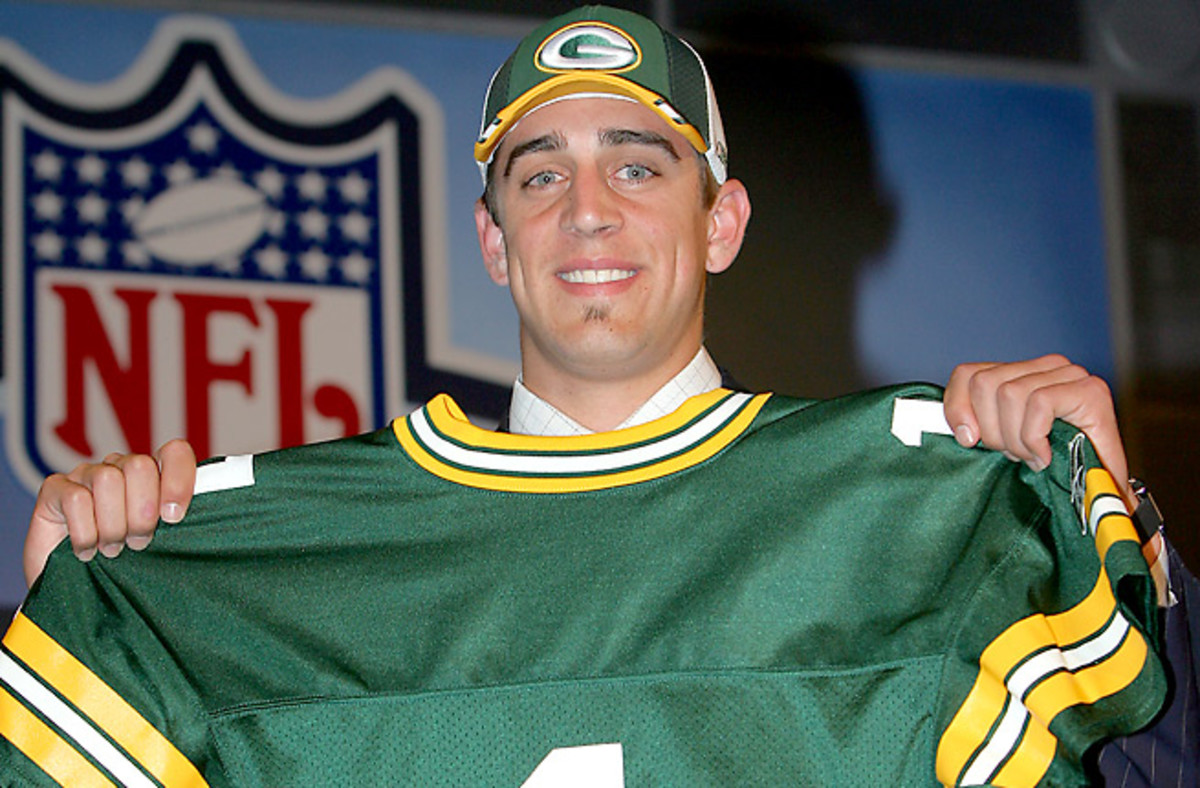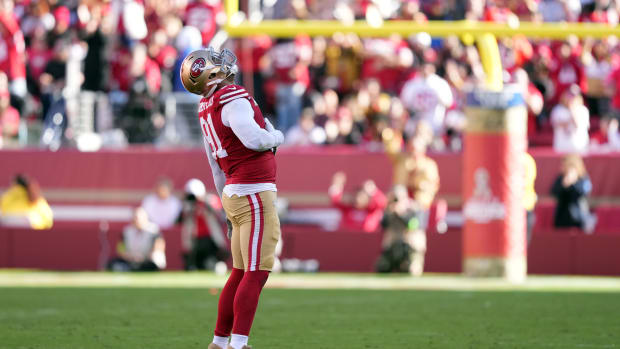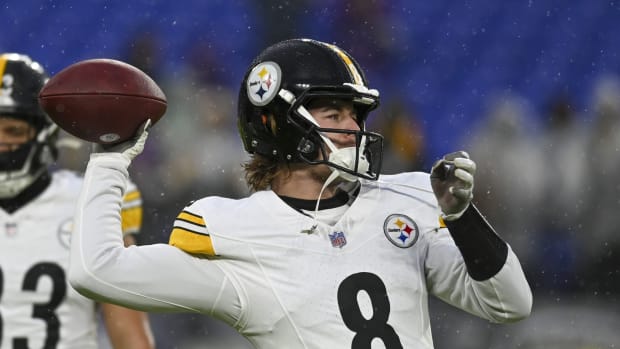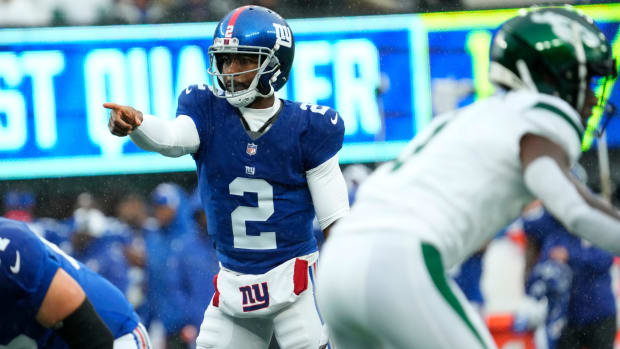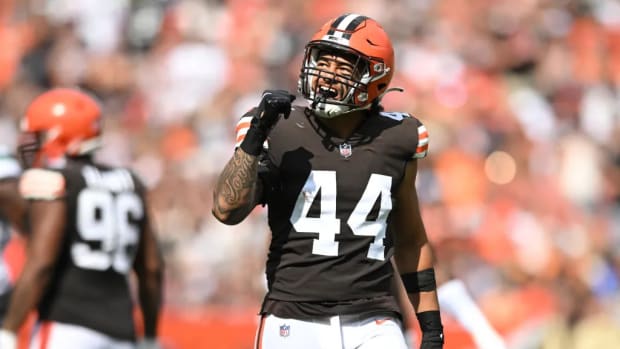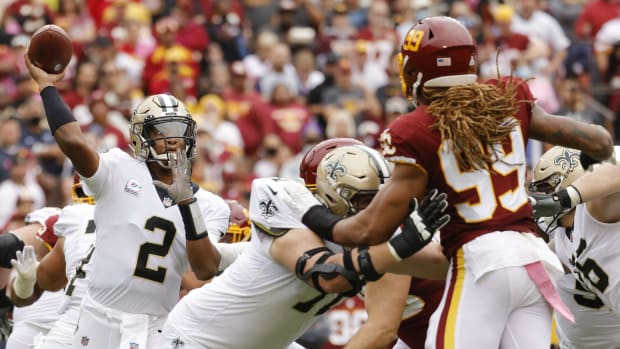NFL draft history full of good, bad and weird moments
Heading into an NFL season, only a handful of teams can truly compete for a Super Bowl title, while a dozen or so other teams trick themselves into believing they can. That leaves the last group, those poor bottom-dwellers, to come up with slogans like "Suck for Luck" as they look forward to April's draft.
For those teams, the NFL draft is the Super Bowl, the moment they can finally shine. Colts fans may not remember the 1997 season when Indy went 3-13, but they do remember drafting Peyton Manning following that dreadful season. Likewise, Green Bay fans have tried to forget both the four-win 1988 season and the '89 draft in which the Packers drafted Tony Mandarich ahead of Barry Sanders.
Franchises are measured by Super Bowl wins, but good drafting is the best way to reach that pinnacle. Still, while some franchises have paved the way to glory in April, others have gone down in flames. The draft has produced some of the most memorable and bizarre moments in league history; some good, some bad and some downright ugly -- the selection of Mandarich being at or near the top of that list.
We combed through the NFL draft archives -- and spent a lot of time on Wikipedia -- to come up with a list of moments that will bring smiles to the faces of some fans, while sending others to look for a suitable wall to bang their heads against.
That is what makes the draft such an anticipated few days: the path of a franchise can be set both for better or worse.
BANKS: Mock Draft 6.0 | BURKE: Big Board 5.0
Decisions, Decisions ...
Leaf vs. Manning -- The 1998 debate between Washington State's Ryan Leaf and Tennessee's Peyton Manning has become one of the seminal moments in draft history. Indianapolis would make the first pick while San Diego would take whoever was left. Manning, of course, turned into one of the greatest players of all time, and Leaf turned into a running punch line, starting just 21 games in his three-year NFL career. In a bitter moment of irony, San Diego finished with one more win than the Colts, solidifying their No. 2 draft spot. One of those wins? In Week 9 against, you guessed it, the Colts.
Williams vs. Bush -- In 2006, Reggie Bush was leaving USC as one of the most dynamic players ever to strap on shoulder pads, and Vince Young had just led an undermanned Texas team to victory over Bush's Trojans to win a national title. Yet, with the top pick, the Texans took Mario Williams in a shocking move, agreeing to a contract with Williams the night before the draft. As it turned out, Williams became a double-digit sack-master, and Reggie Bush enters 2013 with his third team in four years. And Vince Young? The good news is he's available for birthdays.
Rogers vs. Taylor -- Anyone brave enough to admit to being Saints fans in the 1980s will remember New Orleans infamously picking George Rogers at No. 1 in 1981,the same year a guy named Lawrence Taylor went second. Rogers made two Pro Bowls, but Lawrence Taylor is one of the five best defensive players ever. Also, New Orleans deprived us of seeing what kinds of mischief LT would have gotten into on Bourbon Street.
Smith vs. Rodgers -- For weeks leading up to the 2005 draft, it looked like the 49ers">49ers would draft hometown kid Aaron Rodgers with the top pick. When San Francisco picked Utah's Alex Smith instead, Rodgers tumbled down the draft board all the way to the Packers at No. 24, only to sit behind Brett Favre for three years before becoming Super Bowl MVP, NFL MVP and one of the best three players in the league today. Alex Smith, on the other hand, struggled through five seasons before the light turned on in 2011 under 49ers coach Jim Harbaugh. What did that get him? Eventually replaced by Colin Kaepernick and traded to the lowly Chiefs.
Long vs. Ryan -- Miami has spent years trying to replace Dan Marino, yet in 2008 with the top pick and chance to draft Boston College's Matt Ryan, the Dolphins selected Michigan tackle Jake Long instead. Ryan went third to Atlanta, who has made the playoffs four times since and came a win away from the Super Bowl last season. Long recently signed with the St. Louis Rams.
BURKE: Safe or Surprise: Which will your team draft?
Blockbuster Deals
Jerry Rice -- New England made what seemed like a fair trade in 1985 when it swapped first-rounders with the 49ers for an additional second-round pick (the teams also swapped third-rounders). The problem for the Patriots was with that 16th overall pick, the 49ers drafted a kid out of Mississippi Valley State named Jerry Rice. Not only did Rice become arguably the best player ever -- sad trombone for the Patriots -- but the swap also prevented the Cowboys from picking Rice. This trade wasn't a blockbuster in terms of a team giving up a lot to gain a lot, but rather a team giving up enough to get the right player. That's how championships are won -- just ask Rice's three Super Bowl rings.
Mike Vick -- It's easy to forget that for as dynamic as RGIII was at Baylor, Vick was all that and more as a college player, and the obvious choice at the top of the 2001 draft. The Chargers, attempting to move on after that Ryan Leaf debacle, traded away the top pick to Atlanta for the fifth pick, a third-rounder, a second-rounder in 2002 and receiver Tim Dwight. San Diego actually got the better of this deal long-term, selecting LaDainian Tomlinson at five, then Drew Brees with their own pick at the top of the second round.
Ricky Williams -- In 1999, Mike Ditka and the New Orleans Saints bet the metaphoric farm on Texas stud Ricky Williams. They traded away all of their selections to move up to fifth overall to nab the Heisman Trophy winner. It was the first time in history a team had just one pick. The eccentric Williams underwhelmed for three years in New Orleans before being traded to the Dolphins. If nothing else, this pick brought us the famous (or infamous) photos of Mike Ditka wearing a dreadlocks wig.
Tony Dorsett -- Dallas has always been an aggressive team in the draft, and 1977 was no exception. The Cowboys traded three second-round picks to Seattle, along with a first-round pick swap (moving up from 14th to second), to draft Pittsburgh star running back Tony Dorsett. Dorsett was taken one pick after Ricky Bell, who tragically died in 1984 of heart failure, and was named Offensive Rookie of the Year.
Robert Griffin III -- The history of this deal is still to be written, but after seeing one season of the 2012 second overall pick, the Redskins can't complain about the results of this monster draft trade (for once). Washington swapped first-round picks with the Rams, giving up its sixth overall pick for the St. Louis' No. 2 choice in addition to shipping off its '12 second-round pick, plus 2013 and 2014 first-rounders. Washington made the playoffs in RGIII's first season, as the phenom dominated the NFL from the start, reinvigorating a downtrodden Redskins fanbase along the way.
BURKE: First-round trades you may see
Well, This Is Uncomfortable...
John Elway says no to the Colts -- In 1983, Stanford standout John Elway could have played baseball or football after playing one summer of minor league baseball with the New York Yankees, an option he made abundantly clear to the NFL if he didn't go to the right team. Elway said he'd rather play baseball than be a part of the bumbling Colts franchise. Baltimore took him anyway, and eventually was forced to trade him to Denver for Mark Hermann, the rights to Chris Hinton and a first-round pick that became Ron Solt. It remains one of the most one-sided trades in NFL history, with Elway's ultimatum setting a precedent. It's easy to forget that same year Jim Kelly initially refused to sign with the Bills and held out the entire year before finally joining the team.
Bo Jackson says no to the Bucs -- Three years earlier, Elway's baseball threat turned out to be just that, a threat. Bo Jackson took it one step further. After being selected first overall in 1986 by the Buccaneers, who made it clear they didn't want Jackson to be a dual-sport athlete, Jackson signed with the Kansas City Royals instead. A year later, the Bucs lost his draft rights, and the Raiders took him in the seventh round. Oakland was able to keep Bo happy by allowing him to play both baseball and football, unwittingly unleashing the greatest player in Tecmo Bowl history.
Eli Manning says no to the Chargers -- The Manning family has made life miserable for Chargers fans. After the Peyton Manning/Ryan Leaf debacle, presumptive 2004 top pick Eli Manning -- with the help of father Archie -- made it abundantly clear he had no intention of playing for the Chargers, the team owning the top selection. Despite that, San Diego drafted Manning, and the Ole Miss quarterback had to go shake the commissioner's hand holding up a Chargers jersey. San Diego did, of course, trade Manning, who has since won two titles with the Giants.
Fans let Roger Goodell hear it over potential lockout -- Commissioners don't usually factor heavily into the draft's moments outside of the immortality associated with announcing the picks. But in 2011, despite the possibility of a lockout putting the season in jeopardy, the draft went along as planned, putting the commissioner in a major spotlight. Roger Goodell, already not a fan favorite, was booed mercilessly at the outset of the draft and regularly as he walked up to the podium to announce each pick.
Eagles fans boo Donovan McNabb -- Philadelphia fans are famous for throwing batteries and snowballs at games, once even booing Santa Claus. Donovan McNabb feels Kris Kringle's pain. In 1999, the Eagles picked the Syracuse quarterback second overall. As McNabb walked to the podium, Philly fans booed the selection mercilessly, upset that their team didn't draft Ricky Williams. In retrospect, the Eagles dodged an all-time bullet by taking McNabb, who went right after Tim Couch and right before Akili Smith. Yikes.
Memorable Waits
Aaron Rodgers -- Not only can the rest of the NFL thank the 49ers for letting Rodgers slip to a loaded Green Bay team, but also for ticking Rodgers off. Falling from the top overall pick to 24th with the Packers took more than four and a half hours in real time. Waiting in the green room with cameras trained on him, we watched Rodgers languish in uncertainty, creating motivation that he's said has driven his career. As mentioned earlier, that has worked out pretty well for Rodgers, and not so well for the rest of the league.
Dan Marino -- No one could blame the Colts for taking John Elway at the top of the 1983 draft, despite having to trade him. But four quarterbacks were taken after Elway and before Dan Marino at 27th overall. Jim Kelly is an all-time great and Ken O'Brien was a Pro Bowler, but neither of them can match the legacy of Marino, probably the greatest pure thrower the league has ever seen. And Todd Blackledge and Tony Eason? Ugh.
Randy Moss -- Few had questioned Randy Moss's talent leading up to the 1998 draft. Attitude and off-field issues caused Moss to fall outside the top 10 and, while teams traded up, none of them did so to nab the Marshall star. Moss fell to the Vikings at 21, where he promptly began torching the league. Three teams in Minnesota's division picked before the Vikes and came up with Curtis Ennis, Terry Fair and Vonnie Holliday.
Brady Quinn -- After leading Notre Dame football to a resurgence, Brady Quinn looked like he might be a top-five player in the 2007 draft. Cleveland, in need a quarterback, was rumored to be the top landing spot at No. 3 overall. Instead, the Browns took Joe Thomas, causing Quinn to tumble until Cleveland jumped back in at 22 in a trade with the Cowboys to nab him. Six of the next seven players selected made Pro Bowls, while Quinn has struggled through his young career.
Da'Quan Bowers -- One of the odds-on favorites to be the top pick in 2011, Bowers was dominant in the ACC at Clemson. Health concerns, including an offseason knee surgery, saw Bowers fall all the way to 51st overall, where the Buccaneers eventually decided his talent was worth the risk. In two years, Bowers has just six starts (all in 2011) and 4.5 sacks.
KING: What I think I know about this draft
The Bizarre
'Rocket' Ismail chooses Canada -- Raghib Ismail was known at Notre Dame as 'The Rocket' for his blazing speed, and he was considered the top player in the 1991 draft. The only problem was, on draft day, he signed a record contract with the Toronto Argonauts, where his annual salary exceeded the salary cap for an entire CFL team at the time (taking advantage of the league's "marquee player" exemption). Dallas passed with the top overall pick, and it wasn't until the Los Angeles Raiders picked him 99 spots later that Ismail went off the board. That same season, Michael Irvin was an All-Pro for the Cowboys.
Time's up on Minnesota -- Since the draft became a television spectacle, one of the strangest moments occurred in 2003 when time ran out on the Vikings to make their pick at No. 7 overall. Afterward, reports surfaced that they had been trying to trade the rights to pick Byron Leftwich to Baltimore. With the gaffe, the Jaguars (Leftwitch) and Ravens (Terrell Suggs) jumped ahead to get their men. The Vikings wound up getting their act together, taking Kevin Williams ninth pick.
The Duke to Atlanta? -- You know how at your fantasy football draft, by the 12th round you and your buddies have had a few Yuenglings, maybe too many, so guys just start yelling out nonsense picks like 'Elvis?' In 1972, Norm Van Brocklin and the Atlanta Falcons called the league to draft John Wayne, who had, in his days in college, been a scholarship football player -- albeit in the '20s. Then-commissioner Pete Rozelle realized the Falcons weren't serious, and didn't allow them to make the prank pick.
I was drafted? -- In the modern age, information is impossible to avoid. But that clearly wasn't the case in 1944. Just ask Norm Michael. The former Syracuse fullback was drafted in the 18th round that year by the Eagles. The only problem? He didn't find out about it until 1999, when he read a list of every Syracuse football player to ever be drafted in the local newspaper. Apparently, the Eagles were unable to locate Michael in 1944, unaware that he had joined the Army and was stationed in Alabama.
Mr. Irrelevant is born -- The phrase given to the last player selected in a given draft was created in 1976 when Kelvin Kirk was drafted by the Pittsburgh Steelers. Shortly after, a press conference was held by Paul Salata, a former USC football player -- using a 40-something butcher pretending to be Kirk. Apparently, the NFL had decided to make a big deal about the last player picked in the draft, to throw a big party and have some fun with it. But Kirk's plane had been delayed out of Dayton and he didn't make it in time, so Salata literally pulled someone off the street to fill in. The gathered media bought it, and the Mr. Irrelevant moniker was coined.
































